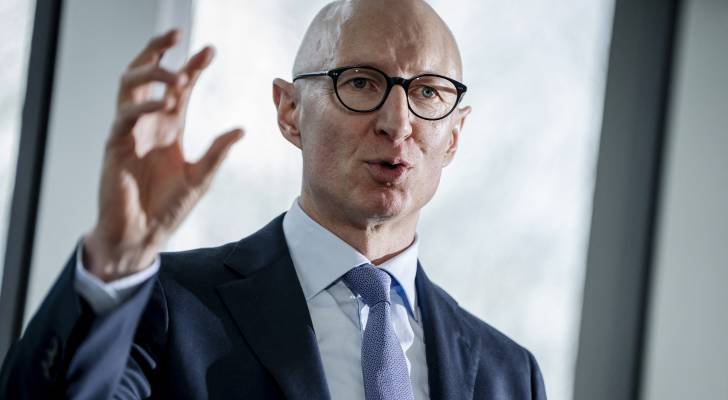
Danish pharmaceutical company Novo Nordisk — best known for its blockbuster weight-loss drugs Ozempic and Wegovy — has signed a $2 billion deal to acquire the global rights to an experimental obesity treatment from China’s United Bio-Technology (Hengqin) Co.
The March 24 agreement includes milestone payments of up to $1.8 billion, plus tiered royalties.
Don’t miss
- I’m 49 years old and have nothing saved for retirement — what should I do? Don’t panic. Here are 5 of the easiest ways you can catch up (and fast)
- You’re probably already overpaying for this 1 ‘must-have’ expense — and thanks to Trump’s tariffs, your monthly bill could soar even higher. Here’s how 2 minutes can protect your wallet right now
- Gain potential quarterly income through this $1B private real estate fund — even if you’re not a millionaire. Here’s how to get started with as little as $10
The new drug in question, UBT251, is a next-generation therapy designed to tackle obesity and type 2 diabetes by targeting three key hormones including, GLP-1 and GIP — which regulate appetite and blood sugar — and glucagon, which helps stabilize blood sugar levels.
Roughly 15.5 million U.S. adults have already used injectables for weight loss, according to Gallup. With access to weight-loss medications still limited by patchy insurance coverage, UBT251 may face the same barriers, even as it promises new possibilities.
Here’s what this deal means for Americans looking for alternate treatments for their diabetes or chronic obesity.
Taking over the market
In the past, Senator Bernie Sanders has criticized Novo Nordisk (NYSE:NVO) for charging American patients far more than their international peers for the same medications. However, CEO Lars Fruergaard Jorgensen has blamed the U.S. health care system’s bureaucracy and markups for the high prices.
But now, Novo Nordisk has changed its pricing model with the launch of NovoCare Pharmacy — a direct-to-patient service offering all doses of Wegovy at $499 per month for patients paying cash. This strategy was designed for those without insurance or whose plans don’t cover weight-loss drugs.
Ozempic’s insurance coverage dropped 22% from 2024 to 2025, according to GoodRx, leading to 1.1 million Americans having no access to these medications.
"If only certain patient populations get access to these medications — those primarily with private insurance, more generous health plans — then there’s a huge percentage of the U.S. population that isn’t getting access to these medications," lead author Christopher Scannell told Axios.
When Novo unveiled its latest retail gambit, Wall Street raised a glass as the stock also surged nearly 4%. However, it remains unclear — in a system rife with co-pays and corporate contracts — whether this will translate into improved access or affordability for American consumers.
Read more: Want an extra $1,300,000 when you retire? Dave Ramsey says this 7-step plan ‘works every single time’ to kill debt, get rich in America — and that ‘anyone’ can do it
Will this make a change?
Despite the excitement surrounding NovoCare, the company’s U.S. strategy has faced some ups and downs. Since last summer, Novo Nordisk’s stock has dropped by nearly 50% — reflecting investor concerns about pricing pressure, increased competition and lingering supply chain issues.
Last year, the overwhelming demand for Ozempic and Wegovy led to widespread shortages in the U.S., prompting regulators to allow compounding pharmacies to replicate the drugs — often at a lower cost. That shift disrupted the market and Novo Nordisk responded with a renewed push for its own branded products. NovoCare is part of that strategy.
"Novo Nordisk continues to advance solutions for patients that improve affordability and access to our medicines, whether they have insurance or not,” said Dave Moore, President of Novo Nordisk Inc.
But with insurance coverage for weight-loss drugs still limited and ongoing questions about affordability, it’s too early to tell whether this latest deal — and the rollout of UBT251 — will meaningfully lower costs or intensify market competition. For now, Novo Nordisk seems determined to dominate the playing field — but the question remains: will everyday Americans be able to afford to join the game?
What to read next
- Don’t have the cash to pay Uncle Sam in 2025? You may already be eligible for a ‘streamlined’ handshake with the IRS — here’s how it works and how it can potentially save you thousands
- Robert Kiyosaki warns of a ‘Greater Depression’ coming to the US — with millions of Americans going poor. But he says these 2 ‘easy-money’ assets will bring in ‘great wealth’. How to get in now
- Here are 5 ‘must have’ items that Americans (almost) always overpay for — and very quickly regret. How many are hurting you?
This article provides information only and should not be construed as advice. It is provided without warranty of any kind.